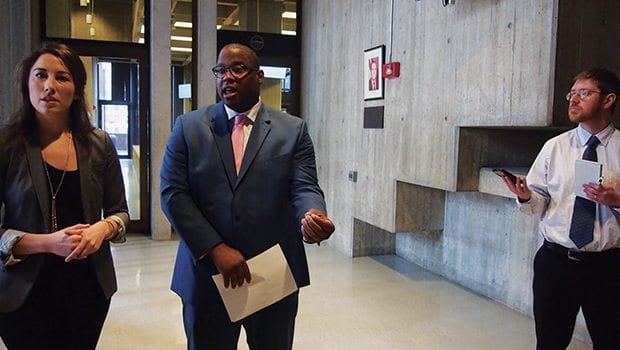
With President Trump’s pledge to target undocumented immigrants via raids and deportation, immigrant activists in Boston are gearing up for what often comes next: legal proceedings.
City Councilor Tito Jackson announced last week that he had introduced legislation to create an Immigrant Legal Defense Fund for the city.
“We are at a time in our country where we ought to make sure we are standing up for our immigrant residents,” Jackson told reporters during a press conference at City Hall last week.
Jackson’s proposal draws from a model used by other cities, including Chicago, Oakland and Washington D.C., in which the city would partner with other funders to pay for attorneys to represent defendants facing deportation.
While states provide legal counsel to indigent defendants in accordance with the U.S. Constitution’s guarantee of equal protection under the law, the federal government does not provide counsel for foreign nationals facing deportation.
When immigrants face deportation proceedings without legal representation, they are able to avoid deportation in four percent of those cases, according to Liza Ryan, organizing director at the Massachusetts Immigrant and Refugee Advocacy Coalition. But 47 percent of those who have legal representation are granted relief.
“What this demonstrates is what matters is not the merit of the case, but whether or not they have legal representation. The least we can do as residents of this city is to live up to our constitution, which guarantees equal protection under the law.”
Ryan called the failure to provide legal representation for immigrants facing deportation a violation of due process.
While there are no hard numbers, it is believed that there are as many as 190,000 immigrants living in Massachusetts without documentation, including an estimated 10,000 Irish nationals in Boston, Jackson said.
Jackson said the Trump administration’s pledge to deport immigrants could hit Boston’s economy particularly hard. Students, who typically come to the United States legally on student visas, spend on average $55,000 a year to attend local colleges and universities, contributing as much as $660 million to the Massachusetts economy, he said.
While students are not likely to face deportation, the anti-immigrant sentiment being propagated at the national level along with Trump’s executive order banning travel from seven predominantly Muslim countries could affect local colleges and universities, Jackson said.
Jackson’s proposal calls for the legal fund to operate initially as a pilot project. The council has not yet debated the matter and there are details to be worked out, including how long the pilot will run and with which organizations the city will partner to fund it. “We will be reaching out to foundations as well as corporations and universities,” Jackson said.
Jackson called immigrants part of the “fabric of the city,” and noted that half of the students in BPS schools have at least one parent who speaks a language other than English.
“We are Boston,” Jackson said. “We lead and we don’t follow on issues that are critical to the people in our city.”






